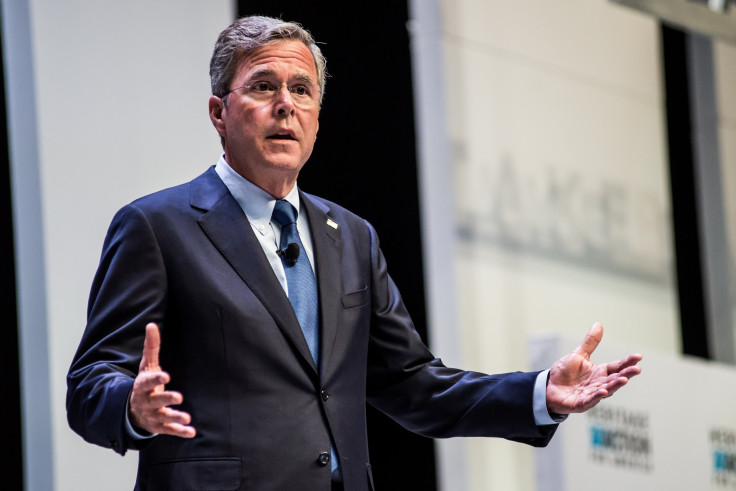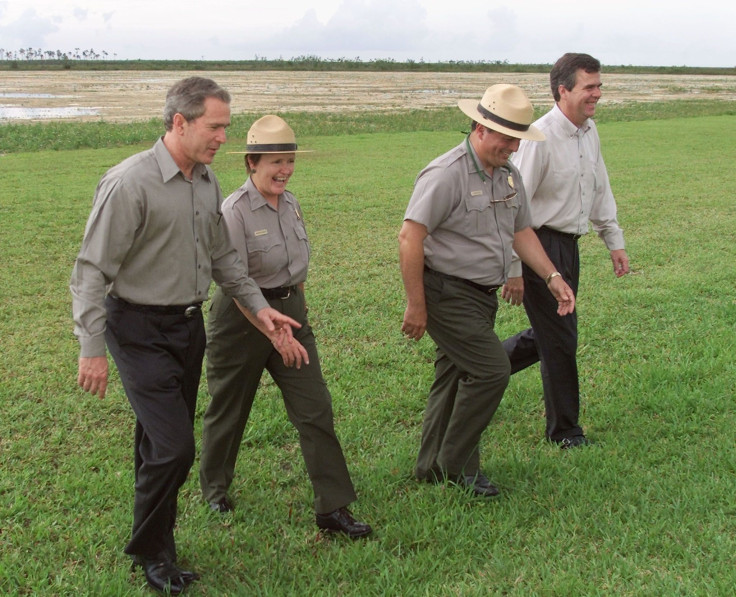Jeb Bush Energy Plan: Is 2016 Candidate Embracing Far-Right Policies To Appease Donors, Primary Voters?

Republican presidential candidate Jeb Bush is taking a hard conservative stance on the environment in his new national energy plan. The platform, which he is announcing Tuesday, seeks to appeal to Republican primary voters at a time when the former Florida governor's mixed record on energy and environmental issues has so far made it difficult for him to win over either conservatives or liberals.
Once considered the presumptive Republican nominee due to his establishment credentials and financial backing, Bush has been struggling to excite Republicans in recent months as Donald Trump and other more conservative, so-called outsider candidates draw enthusiasm with positions and statements far to the right of Bush. Recent polling averages have Bush doing worse than ever, and donors are beginning to get spooked.
The candidate's energy plan is tailored to win favor among conservative Republicans. In advance of its official announcement Tuesday, Bush outlined some aspects in a post on the website Medium, according to Reuters. The plan will include ending the ban on U.S. oil exports and lifting restrictions on natural gas exports, policies Bush wrote would create "hundreds of thousands of additional jobs and significantly lower net energy costs within two years." The former governor also said he would approve construction of the Keystone XL pipeline from Canada and will take aim at President Barack Obama's climate change plan that would limit carbon emissions, all popular positions with many Republicans.
On the campaign trail, Bush has already said he supports domestic energy production, favors Keystone XL and is a big proponent of fracking, the hydraulic fracturing oil and gas extraction process. While these are all positions favored by Republicans, his ambivalence on issues like climate change and biofuels and his environmental record from Florida have made it difficult for some Republicans to trust Bush.
Bush's evolving views on the environment might also reflect his eagerness to win over deep-pocketed donors, including business leaders who might not be happy with a candidate who puts swampland protections ahead of development. Several donors familiar from Bush’s governorship have popped up in recent months on the list for the pro-Bush super political action committee Right to Rise, including US Sugar and NextEra Energy, Inc., which owns the utility company Florida Power and Light. The donation from NextEra is particularly notable considering Bush’s past support for the Florida utility. In 2009, after leaving office, he wrote an editorial urging the state Public Service Commission to approve a rate increase for Florida Power and Light, according to the AP.
A number of other large donors to Bush’s 2016 campaign and his super PAC also have ties to the energy industry or to fossil fuel companies. According to the Center for Responsive Politics, a nonpartisan campaign finance watchdog, several law firms and construction companies among Bush’s top 20 donors work with energy industry clients. In addition, top donors to the Right to Rise super pac include oil tycoons T. Boone Pickens and Ray Hunt, among others.
‘Still A Few Question Marks’
Throughout the primary campaign, Bush has espoused moderate views on environmental issues or changed his positions at different times. On the hot-button issue of climate change, Bush said in May he didn’t think the science was clear on the origins of climate change, but in June he took a different tack when he said he believed humans do contribute to it. On the other hand, he joined other Republican candidates in criticizing Pope Francis’s call for a worldwide effort to combat climate change.
With other candidates like Trump, retired neurosurgeon Ben Carson and Florida Sen. Ted Cruz making strident statements questioning th reality of climate change, many in the party’s right flank have seen Bush as weaker -- or at least dangerously unknown -- on these issues. Back in March, for example, the conservative advocacy group Club for Growth told National Journal that it viewed Bush’s spending on environmental policies during his tenure as governor of Florida as cause for concern. Other Republicans and energy leaders have doubts as well.
“From a free-market perspective, Jeb Bush has been solid on many issues, but there are definitely still a few question marks,” said Chris Warren, a spokesman for American Energy Alliance, which is the political arm of the Institute for Energy Research, a nonprofit that advocates for policies that help oil, gas and coal interests and is funded by major conservative donors the Koch brothers. “He's been vocal about the need for regulatory reform, specifically reining in the EPA, which is encouraging given the unprecedented level of overreach we've seen from Obama's EPA. It's less clear where he stands on an issue like the renewable fuel standard. Will he take the principled stand of outright repealing this mandate, or is he content with the status quo, which will lead to higher gasoline prices? That remains to be seen.”
The renewable fuel standard is a law enacted during the George W. Bush administration that requires gasoline and diesel fuel to be blended with a percentage of ethanol, making it particularly unpopular among oil and gas interests. Jeb Bush has gone back and forth in his comments on the renewable fuel standard. Early in 2015 he said it “has worked, for sure” while in Iowa, the crucial first caucus state where voters like the mandate because of their economy’s reliance on corn. But then in August, he came out against the standard, saying it will lead to higher gas prices.
The issue of carbon emissions represents another area where Bush has not previously been as strident as some of his opponents. He has been more willing than other Republicans to discuss various solutions to climate change, which has been seen as worrying by some party strategists. In his new plan, Bush calls definitively for fewer regulations on emissions and said Obama’s climate change plan that seeks to limit emissions "needs to be stopped in its tracks." He also called for lowering energy prices and boosting domestic energy production, demonstrating a focus quite different from the highlighting of his environmental record in Florida earlier in the campaign.

Bush's Florida Record
Before his latest energy plan, Bush had said Republican candidates may need to “lose the primary to win the general” and had focused his talking points accordingly, often touting his environmental record from when he served as governor of Florida from 1999 to 2007. The centerpiece of his environmental legacy is the Comprehensive Everglades Restoration Program, an $11 billion effort by the state and federal governments to restore Florida’s Everglades. He also acquired significant chunks of land for environmental preservation and fought his brother’s administration to prevent drilling near the coast of Florida.
“I never thought that Bush as a governor was a perfect environmental governor, but certainly on balance, he was better than the governor we have right now,” said Eric Draper, executive director of the National Audubon’s Florida chapter, referring to the right-wing Republican Rick Scott, who has let funding for previous environmental programs decrease.
Draper described himself as a lead lobbyist for the environmental movement during Bush’s tenure in Florida. He said he enjoyed working with Bush on projects to restore the Everglades but was disappointed when the governor let the sugar industry push back a deadline for meeting water quality standards in marshes. Republicans and Democrats alike urged Bush to veto the bill because of the Everglades' importance in Florida, but when he signed it into law, he called it "strong legislation built on good policy," the Tampa Bay Times reported.
While Bush’s green record in Florida is largely considered solid by liberals, his focus on the economic costs of caring for the environment is nothing new. Ted Kury, director of energy studies at the University of Florida, said Bush did not seem driven by a passion for the environment as an important cause on its own.
“When questions about the environment came up, he was always, ‘We’re trying to get people back to work,’” Kury said of Bush’s time as governor. “Climate change was not a high priority. That type of quote stands out from his tenure there.”
Bush is scheduled to announce the details of his energy plan Tuesday at Rice Energy Inc. in Canonsburg, Pennsylvania, and he is likely hoping his focus on free markets and the economy will take center stage. The energy plan provides an opportunity for the Bush team to answer conservatives’ lingering questions about where he stands on all types of energy and environmental policy. It just remains to be seen if his proposals can bring energy back to his campaign.
© Copyright IBTimes 2024. All rights reserved.





















